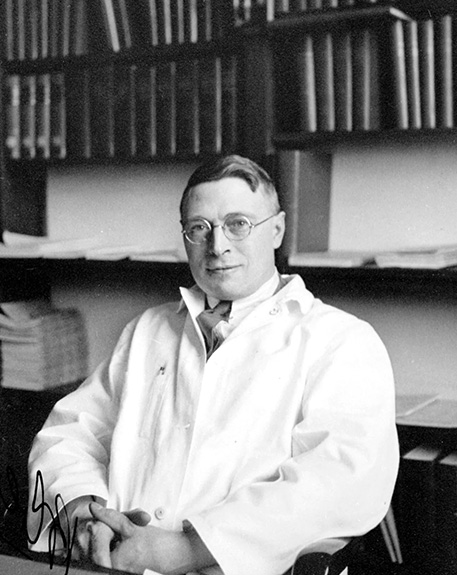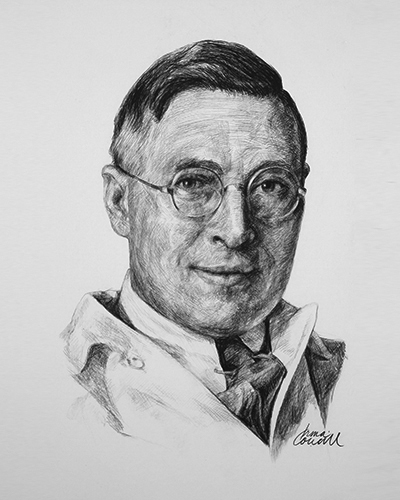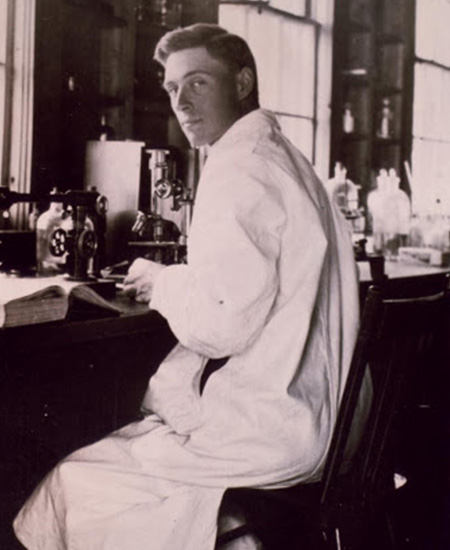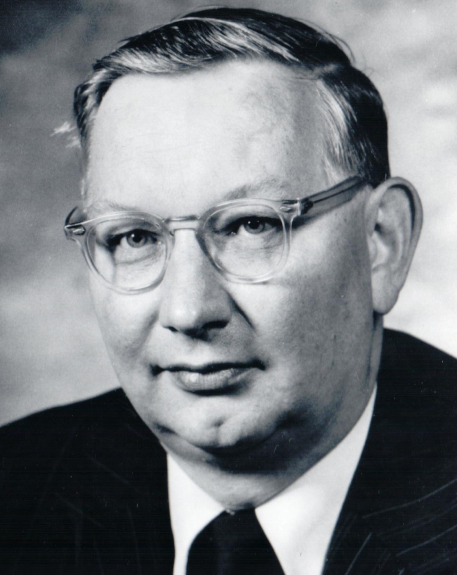1994 INDUCTEE James Collip, MD PhD Hormones, Diabetes, Leadership in Organizational Development
November 20, 1892
(Belleville, Ontario)
June 19, 1965
PhD, University of Toronto (1916)
MD, University of Alberta (1926)
1964: Honorary DSc, University of Western Ontario
1960: Banting Medal, American Diabetes Association
See All AwardsAwards & Honours:
1964: Honorary DSc, University of Western Ontario
1960: Banting Medal, American Diabetes Association
1947: Medal of Freedom
1946: Honorary Doctorate, University of Alberta
1946: Honorary DSc, University of Oxford
1943: Commander of the Order of the British Empire
1941: Charles Mickle Fellowship Award, University of Toronto
1937: Cameron Prize for Therapeutics, University of Edinburgh
1936: F.N.G. Starr Award, Canadian Medical Association
1936: Honorary DSc, Harvard University
1936: Flavelle Medal, Royal Society of Canada
1933: Fellow of the Royal Society of London
1925: Fellow of the Royal Society of Canada

Purified insulin for clinical use and isolated numerous hormones in the human body

A pioneering researcher and builder of Canadian medical institutions
One of the greatest minds of Canadian medicine, Dr. James Bertram Collip is regarded as a pioneer in endocrine research. As an astute biochemist, Dr. Collip had a long and distinguished career marked by numerous discoveries and breakthroughs in biochemistry and endocrinology. Famously, his skills in biochemistry were invaluable to Banting Best’s research; Collip was able to refine and purify insulin to a form which permitted clinical use. This contribution allowed insulin to be mass-produced, making it quickly available to the general public, saving millions of lives.
Key Facts
By the age of 27, Collip had published 24 scientific articles
Isolated ovarian hormones, gonadotrophic hormones from pituitary, and adrenocorticotrophic hormone (ACTH)
J.R.R. Macleod shared his Nobel Prize money with Collip to acknowledge his significant contribution to the discovery of insulin
Professional timeline
Impact on lives today
Dr. Collip’s contributions to endocrinology include the isolation and discovery of several important hormones in the human body, along with creating leading research institutes in four prominent medical schools within Canada. This legacy of scientific excellence and building of research capacity in Canada continues to influence medical and basic science knowledge. Moreover, his contributions to the discovery of insulin still save lives around the world.

1994
-

James Bertram Collip posthumously inducted into the Canadian Medical Hall of Fame
London, Ontario
-

Dr. Collip finished his brilliant career with a 14-year tenure as the Dean of Medicine at the University of Western Ontario
Leadership in Organizational Development, Health and Medical Education & TrainingHe shaped the medical school into an internationally renowned centre of medical education.
-
Following Dr. Banting’s untimely death in 1941, Dr. Collip acted as chair of the Medical Research Council of Canada
Leadership in Organizational DevelopmentDuring the Second World War, he became a leader in Canadian wartime medical research.
-

Collip established and became Chair of McGill University’s new Institute of Endocrinology
Leadership in Organizational Development, HormonesAt the Institute, he established a prestigious reputation for its research endeavours. Here, Collip continued his research on hormones, combining his skills in biochemistry with endocrinology.
-
Passing over an invitation from the Mayo Clinic, Collip instead joined McGill University as the head of their new Department of Biochemistry
Hormones, Leadership in Organizational DevelopmentDuring his tenure at McGill, his research on pituitary hormones was successful in isolating ACTH, a stress hormone which can be a factor in Addison’s Disease.
-
Dr. James Collip succeeded in isolating the parathyroid hormone (PTH)
HormonesThis work established an endocrine function of the parathyroid glands.
-
Macleod and Banting were jointly awarded the Nobel Prize
Macleod shared his monetary prize with Dr. Collip, to acknowledge his significant contribution.
-

Following his early success, Collip returned to the University of Alberta where he accepted a position as head of the Department of Biochemistry
Leadership in Organizational DevelopmentHis research focus was isolating the parathyroid glands’ peptide that maintained normal blood calcium levels in the body.
-
While on sabbatical, James Collip was invited by Dr. J.J.R. Macleod to work with Drs. Banting and Best
DiabetesCollip was able to refine and purify insulin to a form which permitted clinical use.
-
Enrolled at Trinity College at only 15 years old, Collip was one of the youngest students
By the age of 24, he had completed a doctorate degree in biochemistry and was working as a lecturer at the University of Alberta.
1907
He was one of the great minds of Canadian medicine.


